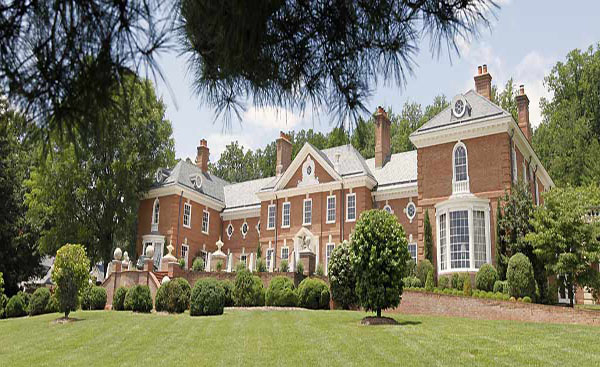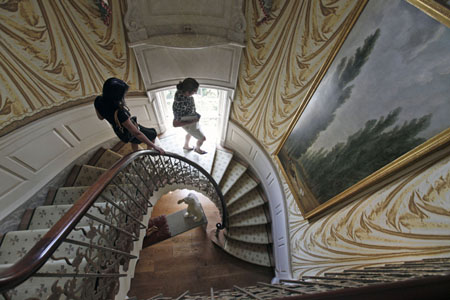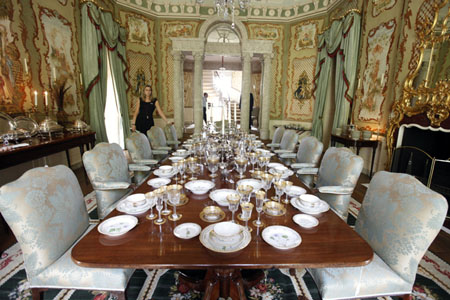 |
| The bank repossessed an Albermarle, Va., mansion owned by Patricia Kluge, but her friend Donald Trump is creatively attempting to control the vast property. Photo: AP Photo/Steve Helber |
In the history of rapid wealth loss, Patricia Kluge stands apart. Once married to one of America's richest men, she won a divorce settlement in 1990 worth more than $100 million and proceeded to spend it on her lifestyle and business ventures. She was forced to sell off her Cartier diamonds, Givenchy gowns and silk drapes before declaring personal bankruptcy in June.
Yet the Fall of the House of Kluge has been a windfall for one man: Donald Trump.
As Ms. Kluge's empire collapsed, Mr. Trump bought. Over the past six months, he swooped in and picked up many of the pieces of her palatial Virginia estate and winery. He bought the 1,000-acre vineyard and winery for a fraction of their original value. He bought 200 acres nearby for less than $500,000, with help from Ms. Kluge and her son.

Now, the pompadoured billionaire and reality-TV star may have outplayed a much bigger rival in a bid for Ms. Kluge's crown jewel: her mansion. Bank of America owns the house after foreclosing and is trying to sell it for $16 million. The 24,000-square-foot neo-Georgian palace has 45 rooms, a spa, home theater, 3,500-bottle wine cellar and 2,000-square-foot sitting room.
One thing the house doesn't have, however, is a front yard. Mr. Trump owns that, having purchased it with his 200 acres. He also owns most of the driveway and the backyard, making a sale to any other buyer difficult. Mr. Trump said he would buy it from Bank of America for $3.6 million.
 |
| Visitors walked down a stairway in the mansion once owned by the Kluges. Photo: AP Photo/Steve Helber |
To make his point, he has erected signs on the front lawn of the mansion that read, "No Trespassing. This Land is Owned by Trump Virginia Acquisitions LLC," aimed at warding off possible buyers. He has also let the lawn go to seed.
"Maybe someone is stupid enough to buy the house," Mr. Trump said. "I wish them luck." The broker for the house, Joseph Marchetti III, responded: "We believe the house is a salable asset as it is."
The mansion spat is just the latest drama to emerge from the outsize life of Patricia Kluge. Ms. Kluge, who was born in Baghdad and once posed nude for a London magazine, married John Kluge in 1981. Mr. Kluge, 34 years her senior, was named the second-richest man in America in 1986 by Forbes magazine after making billions from his Metromedia broadcasting empire. Ms. Kluge became a prominent socialite in New York, Palm Beach and Virginia.
In 1990, the Kluges divorced. Media reported that Ms. Kluge received $1 billion, but the settlement—which included an income stream and property—was actually worth between $100 million and $200 million, according to people familiar with her finances. Mr. Kluge died last September at the age of 95.
 |
| A Sotheby's employee stood in the main dining room in the Virginia mansion. Photo: AP Photo/Steve Helber |
After the divorce, Ms. Kluge plowed much of her fortune into her grand dream: making wine in Virginia. As part of the divorce, she kept the Virginia estate—a scenic tract of rolling hills and lakes nestled below the Blue Ridge Mountains and just down the road from Monticello, the Thomas Jefferson estate. She turned it into the Kluge Estate Winery and Vineyard. She poured more than $100 million into the property and business, say people familiar with her finances. Yet she sold only about a third of her more than 30,000 bottles a year. In 2009, she put the house up for sale—first for $100 million, then $48 million and finally $24 million.
Bank of America, which had a mortgage of $22.8 million on the mansion, foreclosed in February. Mr. Trump bid $3.6 million for the house at the foreclosure auction. Yet Bank of America bought the home back for $15.3 million. (It isn't uncommon for banks to buy back their foreclosed properties at auction). The bank said its bid was in line with the appraisal for the house.
Mr. Trump, however, had quietly cut a side deal that would frustrate the bank's plans. He and the Kluges had been friends for more than 30 years. When Ms. Kluge ran out of money, she came to Mr. Trump's office asking for a rescue.
Mr. Trump saw the potential for a kind of Virginia Mar-a-Lago, with a golf club and guest rooms, built around a vineyard instead of Palm Beach. Ms. Kluge's interest was in keeping the house, land and vineyard together and staying involved in the winery.
Before the February foreclosure, Mr. Trump paid $500,000 for about 200 acres around the house. The property included most of the front yard, most of the driveway and a large chunk of the back yard. The deal also included a right of first refusal on the mansion, meaning that Mr. Trump had the right to match the offer of any other would-be buyer.
The seller of the 200 acres was a Kluge-family trust created for John Kluge II, John's son. People familiar with the trust say John Sr. split off the front yard, driveway and right of first refusal from the house to benefit his son and to prevent his ex-wife from selling the house without permission from his son's trust.
Meanwhile, Mr. Trump began scooping up the other pieces of the estate. The vineyard had been taken over by Farm Credit of the Virginias ACA, which had a $34.8 million lien on the business.
Mr. Trump says he offered the bank $21 million in cash, but the bank declined. An attorney for Farm Credit says Mr. Trump refused to put the offer in writing.
In May, the vineyard went on the auction block and Mr. Trump won the bidding for most of the vineyard for $6.2 million—far less than the $60 million that banks and lenders had once valued the business and property. He paid an additional $1.7 million for equipment and inventory.
Mr. Trump's son Eric is now running the vineyard with assistance from Ms. Kluge. In a statement, Ms. Kluge said she is "thrilled at having a second chance to fulfill my dream."
Meanwhile, Mr. Marchetti says he has had expressions of strong interest in the house from prospective buyers. Even after Mr. Trump's purchase, the house has 95 acres, as well as access rights to the driveway. Mr. Trump's front yard has a conservation easement, meaning he can't easily build in front of the mansion.
As for the Trump signs, Mr. Marchetti says buyers hardly notice.


No comments:
Post a Comment